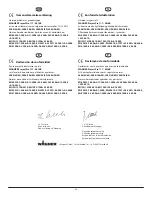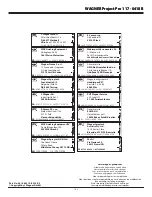
16
WAGNER Project Pro 117 - 0418B
Assembly
Figure 2 - Attaching the Hose
Danger
Make sure that the pump is switched off (position O) and
the spray device is disconnected from the power supply.
1. Thread the high pressure hose to the spray hose port. Tighten
with an adjustable wrench.
2. Thread the other end of the hose to the spray gun. Grip the
spray gun with an adjustable wrench on the handle, and
tighten the hose nut with the other.
i
The spray tip should not be attached until after the
sprayer and spray hose have been purged and primed.
Figure 3 - Attaching the Suction Set
1. Remove cap from inlet valve (a). Thread the suction tube onto
the inlet valve and tighten firmly by hand. Be sure that the
threads are straight so that the fitting turns freely.
2. Push the return hose into the return connection piece.
Before You Begin
Preparation of the Coating Material
Using Project Pro 117 interior wall paints, varnishes and glazes can
be applied by spraying without diluting them, or by diluting them
slightly.
Detailed information is available in the technical data sheet of the
manufacturer (
Internet download).
1. Stir the material thoroughly and dilute it in the container as
per the recommended dilution (an agitator is recommended
for stirring).
Thinning recommendation
Sprayed material
Glazes
undiluted
Wood preservatives containing solvents
or based on water, mordants, oils,
disinfection agents, plant protective
agents
undiluted
Paints containing solvents and water-
soluble paints, primers, vehicle coating
paints, thick-film glazes
dilute by 5 - 10%
Interior wall paint (dispersions and latex
paint)
dilute by 0 - 10%
2. Do a test spray (e.g. on to a piece of cardboard).
i
If the paint sprays evenly, as shown in fig. 11 A, all the
setting must be correct.
If the paint looks stripy after spraying, as shown in fig.
11 B, gradually increase the pressure, or dilute more in
5% steps.
Figure 4 - Locking the Spray Gun
Danger
Always lock the trigger off when attaching the spray
tip or when the spray gun is not in use.
1. The gun is secured when the trigger lock is at a 90° angle
(perpendicular) to the trigger in either direction.
Figure 5 - Pressure Relief Procedure
Danger
Be sure to follow the Pressure Relief Procedure
when shutting the unit off for any purpose. This
procedure is used to relieve pressure from the spray
hose.
1. Lock the spray gun off. Flip the ON/OFF switch to the OFF
position.
2. Turn the PRIME/SPRAY knob to PRIME.
3. Unlock the spray gun and trigger spray gun into the side of
the material bucket. Lock the spray gun.
Priming
Figure 6 - Preparing to Prime
1. Spray a little oil out of the provided flask into the marked
opening (tip: tilt the device back). Light household oil can be
substituted if necessary.
2. Fully insert the Quickflo™ valve to make sure the inlet ball is
free.
Figure 7 - Priming the Sprayer
1. Place a full container of spraying material underneath the
suction tube (a). Secure the return tube (b) into a waste
container.
2. Slide the PressureTrac™ to maximum pressure (+).
3. Turn the PRIME/SPRAY knob to PRIME.
4. Plug in the sprayer and move the ON/OFF switch to the ON (l)
position.
i
The unit will begin to draw material up the suction
tube, into the pump, and out the return tube. Let the
unit cycle long enough to remove test fluid from the
pump, or until spray material is coming from the return
tube.
5. Switch the pump OFF (O). Remove the return tube from the
waste container and place it in its operating position above
the container of spraying material. Use the metal clip to bind
the two hoses together.
Figure 8 - Priming the Spray Hose
1. Unlock the spray gun and turn the PRIME/SPRAY knob to
PRIME.
i
The spray tip should not be attached to your spray gun
when purging your spray hose.
2. PULL the trigger and aim the spray gun at the side wall of a
waste container. If using oil-based materials, the spray gun
must be grounded while purging (see warning below).
Field of application
Coating of interior walls as well as small and medium-sized objects
outdoors (e.g. garden fences, garage doors, etc.).





































